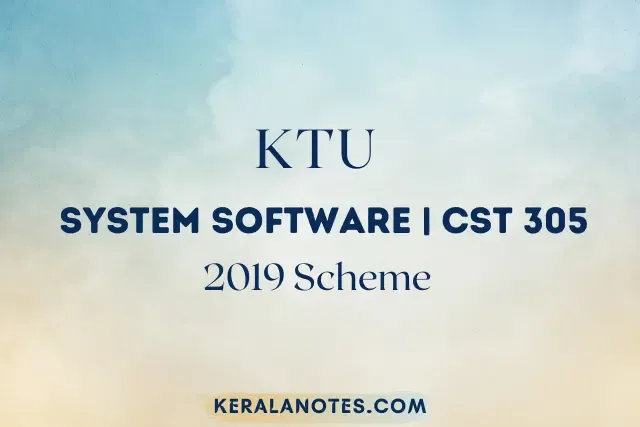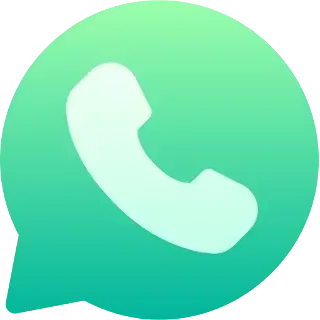System software CST 305 of the KTU S5 2019 scheme is one of the core courses. The purpose of these KTU notes is to create awareness about the low-level codes which are very close to the hardware and about the environment where programs can be developed and executed. This course helps the learner to understand the machine-dependent and machine-independent system software features and to design/implement system software like assembler, loader, linker, macro processor and device drivers. The study of system software develops the ability to design interfaces between software applications and computer hardware.
You need to understand Data Structures, and Computer Organization before taking the notes for KTU Computer science S5 system software which is provided according to the 2019 scheme.
| Board | KTU |
| Scheme | 2019 New Scheme |
| Year | Third Year |
| Semester | S5 |
| Subject | CST 305| System Software |
| Credit | 4 Credit |
| Category | KTU S5 Computer Science |
KTU S5 System Software | CST 303 | Notes (2019 Scheme)
- Distinguish software into system and application software categories.
- Identify standard and extended architectural features of machines.
- Identify machine-dependent features of system software
- Identify machine-independent features of system software.
- Design algorithms for system software and analyze the effect of data structures.
- Understand the features of device drivers and editing & debugging tools.
Module 1
Module 1 - Syllabus
Introduction
System Software vs Application Software, Different System Software– Assembler, Linker, Loader, Macro Processor, Text Editor, Debugger, Device Driver, Compiler, Interpreter, Operating System (Basic Concepts only). SIC & SIC/XE Architecture, Addressing modes, SIC & SIC/XE Instruction set , Assembler Directives.
Module 1 - Notes
Module 1 System Software | CST 305 PDF Notes
Module 2
Module 2 - Syllabus
SIC/XE Programming, Basic Functions of Assembler, Assembler Output Format – Header, Text and End Records. Assembler Data Structures, Two-Pass Assembler Algorithm, Hand Assembly of SIC/XE Programs.
Module 2 - Notes
Module 2 System Software | CST 301 PDF Notes
Module 3
Module 3 - Syllabus
Assembler Features and Design Options
Machine Dependent Assembler Features-Instruction Format and Addressing Modes, Program Relocation. Machine Independent Assembler Features –Literals, Symbol Defining Statements, Expressions, Program Blocks, Control Sections and Program Linking. Assembler Design Options- One Pass Assembler, Multi Pass Assembler. Implementation Example-MASM Assembler.
Module 3 - Notes
Module 3 System Software | CST 301 PDF Notes
Module 4
Module 4 - Syllabus
Loader and Linker
Basic Loader Functions - Design of Absolute Loader, Simple Bootstrap Loader. Machine Dependent Loader Features- Relocation, Program Linking, Algorithm and Data Structures of Two-Pass Linking Loader. Machine Independent Loader Features -Automatic Library Search, Loader Options. Loader Design Options.
Module 4 System Software | CST 301 PDF Notes
Module 5
Module 5 - Syllabus
Macro Preprocessor , Device driver, Text Editor and Debuggers
Macro Preprocessor - Macro Instruction Definition and Expansion, One pass Macro processor Algorithm and data structures, Machine Independent Macro Processor Features, Macro processor design options. Device drivers - Anatomy of a device driver, Character and block device drivers, General design of device drivers. Text Editors- Overview of Editing, User Interface, Editor Structure. Debuggers - Debugging Functions and Capabilities, Relationship with other parts of the system, Debugging Methods- By Induction, Deduction and Backtracking.
Module 5 - Notes
Module 5 System Software | CST 301 PDF Notes
KTU S4 CSE Related Links
| KTU S5 CSE Syllabus | Click Here |
| KTU S5 CSE Study Notes | Click Here |
| KTU S5 CSE Reference Textbook | Click Here |
| KTU S5 CSE Previous Year Solved Questions | Click Here |
| KTU S5 CSE Study Materials | Click Here |
Other Related Links
| CST 301 Formal Languages and Automata Theory | Click Here |
| CST 303 Computer Networks | Click Here |
| CST 305 System Software | Click Here |
| CST 307 Microprocessors and Microcontrollers | Click Here |
| CST 309 Management of Software Systems | Click Here |
| MCN301 Disaster Management (Non - Credit) | Click Here |
| CSL 331 System Software and Microprocessors Lab | Click Here |
| CSL 333 Database Management Systems Lab | Click Here |







